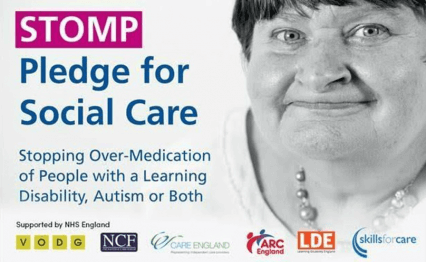More details about NHS STOMP and stopping overmedication
Research has found psychotropic medication could be inappropriately prescribed to as many as 35,000 people with learning disabilities and autism (NHS STOMP). By working with NHS initiative STOMP, we’re changing how we support people with their medication.
STOMP stands for ‘stopping the over medication of people with learning disabilities and/or autism’.
Unnecessary use of these ‘chemical restraint’ drugs can put people at risk of significant weight gain, organ failure and even premature death. With modern approaches to behaviour support, ongoing prescribing of such drugs is often completely unnecessary.

Today I’ve attended a psychiatry review with a person we support. I mentioned Dimensions commitment to the STOMP initiative. This lead to some interesting conversations about our use of PBS as an alternative to medication and took the review in a totally different direction. The outcome is an agreed five year stoppage/reduction plan.
STOMP pledge for health care providers
“NHS England has worked with partners to produce a pledge for health care providers. This is about all health care providers improving the use of psychotropic medicine, offering non-drug therapies and making sure that people, families and staff are fully informed and involved (NHS England).”
“Watch Dr Carter Singh, a GP in Nottinghamshire, describe how non-medical interventions can be used to support people with a learning disability. Dr Singh describes how he often sees people with acute or chronic presentations which are usually related to the person’s environment or frustration at being unable to communicate their wishes effectively and using a medical treatment to resolve a non-medical issue can be counterproductive or even harmful.”
“The aims of NHS STOMP are to:
- Encourage people to have regular check-ups about their medicines.
- Make sure doctors and other health professionals involve people, families and support staff in decisions about medicines.
- Inform everyone about non-drug therapies and practical ways of supporting people so they are less likely to need as much medicine, if any.
Reducing Katy’s medication has transformed her life – here’s how
By Hayley Mead, Locality Manager

Katy was diagnosed with epilepsy and a learning disability when she was 11 years old.
She was reported to have ‘drop seizures’ and required medication to manage these. She lived with family until she was 19, when she moved into residential care.
From here, she moved through several residential care homes over the course of 27 years until she was hospitalised due to a fall caused by malnutrition.
As a result, she was unable to return to her previous setting as it was in an upstairs room and she had become bedbound. She was assessed and discharged to a high dependency Dimensions service – this is where Katy’s journey with Dimensions began.
On admission to the service, she arrived only with a pair of pyjamas. There was little history on where she had been before or what had led her to require the care of the high dependency unit.
On admission, she weighed only 5st3lbs. She was bed bound and too weak to mobilise herself, requiring a hoist, never leaving the house and spending most of her time in bed.
Katy made no effort to interact with her staff or the other people. She had some speech but it was slurred and it seemed to cause her fatigue even to try.
Due to her severe malnutrition, she was prescribed a cocktail of vitamin supplements to give her essential nutrients, amongst a variety of other medications for epilepsy, depression and mood stabilisers.
It was clear that Katy disliked taking her medication as she often refused it. Family members explained to staff that they would only call her in the afternoon because there was no point in calling earlier as she was “too drugged up.”

Katy’s medication was severely affecting her way of life. She displayed many behaviours that would challenge – she would spend hours just screaming non- stop and would assault any staff that were within her reach. The staff team were getting burned out – if they were not dealing with an incident, they were writing it up.
Katy’s support staff raised concerns about the amount of medication Katy was on at their team meetings and took action to start a review process. The team took the lead in requesting a reduction in medication and also a referral to the Intensive Outreach Service from the doctor.
The family were consulted and were very much on board with the plan. The first medication to be reduced was Tegretol, a drug ordinarily used for the management of epilepsy, but also used for the control of bi-polar disorder as well as a mood stabiliser.
Katy was on Tegretol as a mood stabiliser rather than to control her epilepsy. Initially the G.P. reduced the Tegretol from 500mg to 400mg. Staff were to monitor the reactions to this reduction by completing daily logs, seizure activity logs and ABC charts.
Katy was unaltered by the change. There were no differences noted in presentation or frequency, both in her seizure activity or the behaviour.
At the next review the doctor agreed a more drastic reduction, halving the Tegretol from 400mg to 200mg. The monitoring was to continue and the review to take place after the first two weeks.
In the first week of this greater reduction, staff recorded a slight increase in seizure activity. The Intensive Outreach Service were on call for advice with these incidents, although these seemed to stabilise to ordinary levels within the week. Once the first week had passed something started to change.
Katy changed!
She became more alert and didn’t spend the entire day in and out of sleep. There was no challenging behaviour from Katy towards her staff team… in fact she started speaking and joking with them! It even became apparent that Katy actually had an Irish accent – something that had been completely missed due to her limited communication.
Katy started to eat her food, build up her strength and be able to self-transfer to her wheelchair. Before long, she began walking again.
She continued to change over the following weeks and staff were able to build up a strong relationship, finding out her likes and dislikes.
As she trusted her staff, she started going out into the community with them. She had a new chance to engage with her peers, going to community based groups and attending a day centre.
Katy now enjoys going to a music group and staff have discovered that she knows many lyrics to songs – her favourites including ‘Yellow Submarine’ by the Beatles and ‘Mama Mia’ by Abba.
She has more choice, independence, and has been given the opportunity to start living her life.
Indeed, her family were speechless with the difference they witnessed in a recent visit. More than anything, they want Katy’s story to be told – they were elated with the progress that had been made via the dedication of the staff team and the reduction in psychotropic medications.
Katy now weighs 7st7lbs and enjoys picking clothes, perfume and make up to wear for the day’s activities ahead. Her life has improved dramatically and she has transformed as a person.
So what’s next? Well, she has now been discharged from the Behavioural Support Team and the dietician.
And as I write, this week she is looking forward to moving out of the high dependency unit and joining a much smaller Dimensions service. Katy will continue her medication reduction journey with Dimensions complete support.
Katy has her life back!








